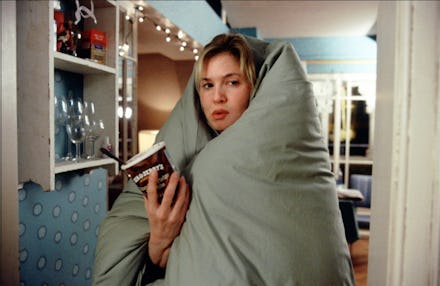Science Has Great News for People Who Live Alone

The word "alone" has many negative connotations, but when used in the context of living without a mate, none apply. In fact, living alone may be one of the greatest joys a person can experience.
Sure, having a roommate is a rite of passage for emerging adults. In 2010, Pew Research found that 15% of 18- to 29-year-olds live with roommates to save money. But for those who don't have to split the rent, immediate benefits ensue like not having to rush to empty the sink, compromise on Netflix choices, or having to wear pants, ever.
But the benefits extend beyond laziness. Science has excellent news for solo dwellers: There's compelling research that bunking alone can be pretty great for you.
Mic combed through the research and spoke with a few millennials lucky enough to live alone. Our takeaway? It's decidedly awesome. Here's why.
You can hoist that freak flag: Living alone gives us time to be a little more pensive and get familiar with ourselves, free from the distractions and judgments of others.
"What emerges over time, for those who live alone, is an at-home self that is markedly different — in ways big and small — from the self [we] present to the world," writes Steven Kurutz in the New York Times. And that means indulging wonderful habits like bantering with ourselves or dressing like a hermit.
Kayla Chapman, a 25-year-old recruiter in Columbus, Ohio, agrees. "I think the biggest perk of living alone ... is the space and freedom to get to know who you really are," she told Mic. "You're not constantly being watched or judged by another person — you can truly be yourself both day and night."
Science might call this "self-actualization," a person's active journey toward self-fulfillment. Psychologist Abraham Maslow, who studied the concept throughout his career in the early- to mid-20th century, cited solitude as one of the defining characteristics of self-actualized people.
You're more social (no, really): Living alone often results in a healthier social life, not a stunted one, according to Eric Klinenberg, a professor of sociology at NYU who penned the book Going Solo: The Extraordinary Rise and Surprising Appeal of Living Alone.
"People who live alone tend to spend more time socializing with friends and neighbors than people who are married," Klinenberg explained in an interview with Smithsonian Magazine. "Living alone is not an entirely solitary experience. It's generally a quite social one."
Spending time by yourself helps you value time with friends. And the time you spend with other people is all by choice, not forced.
You're becoming the chillest person that ever was: When you live with roommates or a significant other, there's always some sort of clamor: your roommate's Spotify playlist, your other roommate vacuuming his bedroom for the third time this week. Not so when you're alone. (Well, assuming your apartment is blessed with thick walls.)
"Living alone is one way to get a kind of restorative solitude," Klineberg notes. "Your home can be an oasis from the constant chatter and overwhelming stimulation of the digital urban existence."
And science has shown time and again our busy brains seriously, desperately need more downtime. "Downtime replenishes the brain's stores of attention and motivation, encourages productivity and creativity, and is essential to both achieve our highest levels of performance and simply form stable memories in everyday life," wrote Ferris Jabr in Scientific American. Sounds good to us.
You occupy a nag-free zone: Mandy Menaker, a 26-year-old marketer living in Brooklyn, is quick to rattle off the perks of living alone: no rush to scrub dishes, no pestering roommates for rent, plenty of space for friends to crash. But the best part, she says, is not having to apologize for her dog.
"I was able to get a 10-week-old puppy and not worry about her accidents in the house for the first few months," Menaker told Mic. "If she chews the furniture, I don't feel guilty for ruining a roommate's things. [I] don't need to apologize to anyone for my dog being a puppy."
And researchers in Denmark recently reported too much bickering can actually shorten your lifespan. "Having frequent arguments with partners, friends or relatives can increase the risk of death in middle-age," the BBC reports.
It's basically career development: Allie Artur, a 27-year-old public relations professional in Philadelphia, says productivity might be what she misses most about living alone. "I'm easily distracted, so when I live with someone — now my husband — I can easily get stuck talking for an hour," she told Mic. "I'm much more productive when I'm alone."
She's right: It's hard to write that perfect essay, or compose the perfect song, when your roommates are loudly arguing in the next room. But when you're alone, brilliance can strike.
"Solitude has long been linked with creativity, spirituality and intellectual might," reported the Boston Globe in "The Power of Lonely," citing (among others) Christopher Long and James R. Averill's "Solitude: An Exploration of Benefits of Being Alone."
"When we let our focus shift away from the people and things around us," wrote Leon Neyfakh in the Globe, "we are better able to... [think] critically and reflectively about our own thoughts."
So to all of you studio-apartment dwellers reveling in your solo status, know that you've actually made a sensible, adult choice. You're more relaxed. You're in touch with your true self. You're working on your next magnum opus. And you're doing it all in sweatpants.